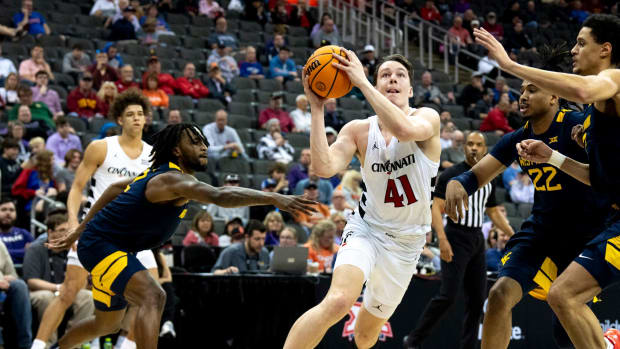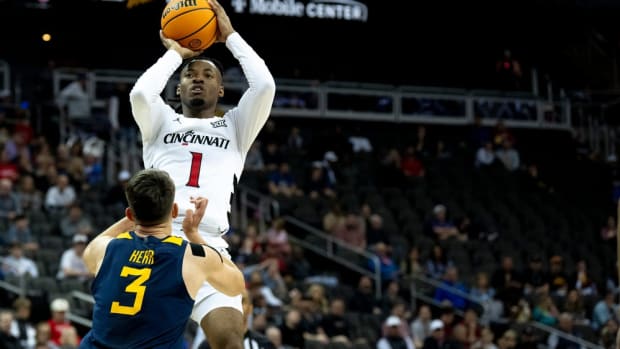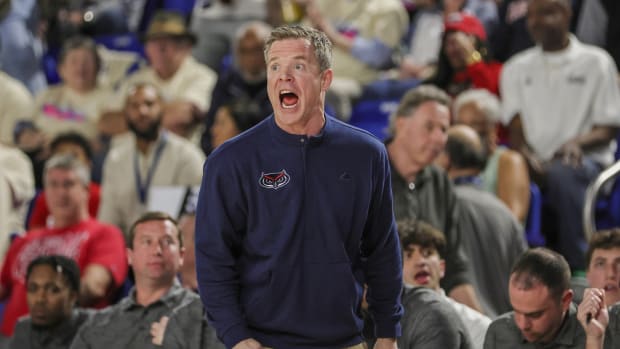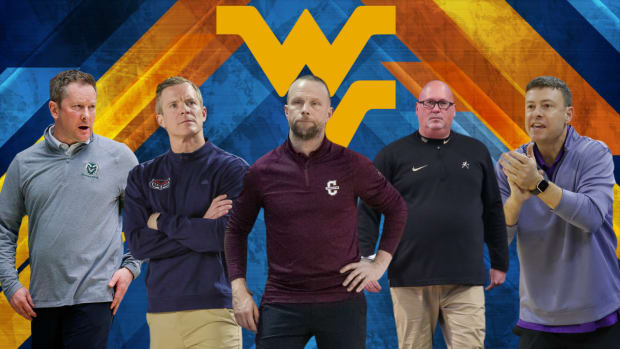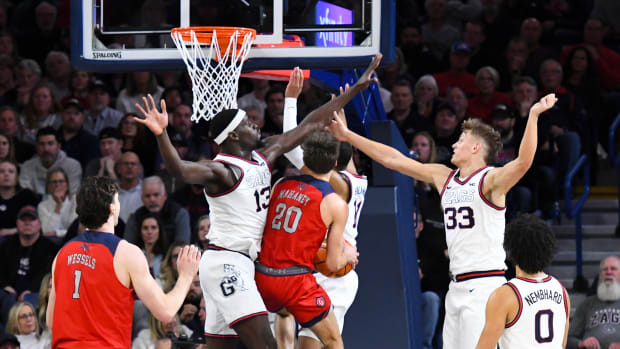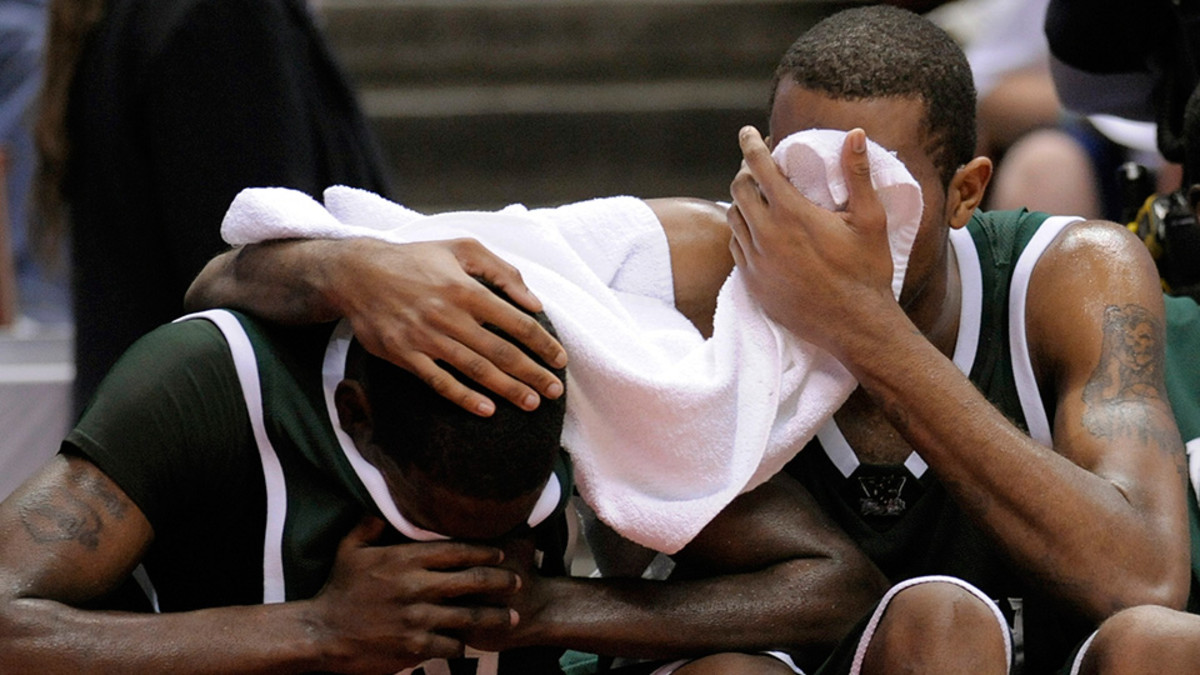
What it's like to lose—badly—as a No. 16 seed
Greg Lewis felt confident going into Selection Sunday in 2002. The senior forward and his Winthrop Eagles were entering their third straight NCAA tournament as Big South champions. Although they had lost to Oklahoma as a No. 14 seed in 2000 and in the play-in game to No. 16 seed Northwestern State in 2001, Lewis thought his career had been building toward one big upset. Then Lewis heard who Winthrop’s opponent would be: defending national champion and No. 1 seed Duke.
“We were happy,” Lewis says about the draw. But with 14 years of hindsight, he can admit that confidence wasn’t absolute. “Even though deep down I know people were like, ‘S---, we gotta play them?’”
The Blue Devils featured eventual player of the year Jay Williams, along with Carlos Boozer, Chris Duhon and Mike Dunleavy, but the Eagles were on a six-game winning streak and had no plans of rolling over.
“We just had confidence,” Lewis said. “We were undersized, but we were gritty. We weren’t going to back down.”
When the final buzzer sounded, though, Winthrop had lost 84–37.
Welcome to life as a No. 16 seed.
*****
Chances are you don’t remember the 2002 Winthrop Eagles, but there are many teams like them. Every March, heroes emerge from unexpected corners. But for every Valparaiso, George Mason and Florida Gulf Coast, there are two or three teams that don’t have any shining moments.
For many small programs in minor conferences, reaching the NCAA tournament is the primary mission at the start of each season. “That was our main goal every year,” said Bill Edwards, a star forward for Wright State from 1990 to ‘93. “Try to win that conference tournament. Try to go to the Big Dance.”
Edwards accomplished that goal his senior year, winning the Mid-Continent Conference tournament to claim the Raiders’ first ever trip to the NCAA tourney. Their reward was a first-round matchup against Bobby Knight’s top-seeded Indiana Hoosiers, a team that featured Naismith Player of the Year Calbert Cheaney and returned its four leading scorers from the 1992 Final Four team. Edwards scored 18 points, but his team lost 97–54.
“It’s not the way I wanted to end my college career,” Edwards said. “We had aspirations of upsetting Indiana, but we got destroyed.”
Carl Lucas can relate, too. After three straight SWAC tournament exits, his Mississippi Valley State team finally won the league in his senior year in 2008. “It was almost like winning the NCAA tournament,” Lucas said. “Coming out on top and knowing that we were going to the Big Dance. I think that’s every college kid’s dream.”
His Delta Devils flew all the way to Anaheim, Calif., where they were waxed by No. 1 seed UCLA. Kevin Love, Russell Westbrook and co. beat them 70–29.
Those 29 points remain the fewest any team has scored in a tournament game since the 1940s.
*****
Since the men’s tournament expanded to 64 teams in 1985, there had been 124 matchups between a No. 1 seed and a No. 16 (going into this year’s tournament). The favorites are 124–0, and more of those games have been decided by 40-plus points than have been kept within single digits.
margin | Number of games |
1–9 points | 15 |
10–19 points | 27 |
20–29 points | 41 |
30–39 points | 24 |
40-plus points | 17 |
While close calls do occasionally arise, the talent gap between a No. 1 and No. 16 is often simply too wide for a competitive game.
Lewis remembers one play vividly. “One time I ended up switching off on Duhon,” he said. “Duhon was close to half court, and I’m talking back to him. ‘Ah, you’re not gonna shoot that from there.’”
You know how this story ends.
“And he shot it and made it. And he looked at me and said, ‘I told you.’”
Lucas has similar memories: “I ended up running out on Darren Collison and he blew by me like I wasn’t even there,” he said. He also laughs now about a hard foul he committed against Kevin Love, which he says drew a lot of boos.
Getting crushed by future NBA stars often results in mixed feelings.
Lucas regrets that he didn’t play more aggressively, because his team was trying to slow down the tempo. “I didn’t play my game,” he says now.
Yet players on the wrong side of those blowouts often still have fond memories of their tournament experience. “It was just an exciting moment,” Lewis said of Winthrop’s run-in with Duke. “For a young man to go through that, it’s kind of like having a little bit of celebrity. Everybody knew who we were. We had [ESPN broadcaster] Dick Vitale talking about us.”
Lucas said his game against UCLA in Anaheim’s Honda Center had the biggest crowd he’s ever played in front of. “Man, it was a big, big, big arena,” Lucas said. “And every seat was filled. It was so loud. Playing in the SWAC, you don’t get crowds like that ... It was a glorious opportunity for me. I’ll always cherish it.”
For many mid-major players, just sharing the court with those storied programs was a reward for a successful season.
“I got to shake [Duke coach Mike Krzyzewksi’s] hand,” Lewis said. “He said good game and wished me luck.”
Edwards had a similar experience. “Coach Knight called me over, shook my hand and said I was a good player,” he said.
The compliment stuck with him. Edwards played in three NBA games for the Philadelphia 76ers and then played pro ball for more than a decade overseas. He still counts that moment with Knight—after fouling out of a 43-point loss—as one of his career highlights.
*****
For these losing teams, the bad feelings often begin to fade by the time they arrive home. Winthrop lost by 47 points, but Lewis says they were greeted by a parking lot full of cheering fans. “Nobody was disappointed in anything we did,” he said. “They loved us.”
He played pro ball in countries all over the world, but said he still has pictures from that Duke game at home.
Lucas is now a math teacher and the head basketball coach at his alma mater, Simmons High School in Hollandale, Miss. Scoring only 29 points still stings a little, but he laughs about it—at least he’s in the record books, he’ll say.
His players ask about his career and he gets some extra credit for having faced Love and Westbrook.
“Although it was a loss, I still feel like I won,” Lucas said. “Coming out of the SWAC, if you go to the big tournament, that’s an accomplishment in and of itself.”
And it’s a talking point to deliver for his guys in western Mississippi, in a town about 250 miles north of New Orleans. “Just because you’re from a small town doesn’t mean you can’t do big things,” he said.
For Edwards, every March means more daydreaming about what might have been. “You sit back and think, ‘What if we’d won that game?’” Edwards said. “’What would have been next? How’d we be remembered now?’ It’s definitely something that jumps into your mind.”
His oldest son, Bill Edwards Jr., played at Penn State and then Miami (Ohio) from 2010 to 2014, but never reached the Big Dance. His second son Vince is a sophomore forward at Purdue, who got his second crack at the tournament this year. Last year his Boilermakers lost to No. 8 seed Cincinnati in overtime by a single point. This year they fell to No. 12 seed Little Rock in double overtime.
But whether a team loses in overtime or by 40 points, whether it’s remembered or ultimately forgotten, the players who participate in March Madness are all left with stories for the rest of their lives.

